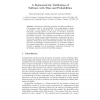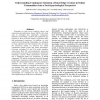661 search results - page 7 / 133 » What Can We Expect from Program Verification |
MFCS
2005
Springer
14 years 2 months ago
2005
Springer
Abstract. Feige and Kilian [5] showed that finding reasonable approximative solutions to the coloring problem on graphs is hard. This motivates the quest for algorithms that eithe...
FORMATS
2010
Springer
13 years 6 months ago
2010
Springer
Abstract. Quantitative verification techniques are able to establish system properties such as "the probability of an airbag failing to deploy on demand" or "the exp...
HICSS
2009
IEEE
14 years 3 months ago
2009
IEEE
Grounded on both social cognitive theory and expectation-disconfirmation theory (EDT), this study aims to investigate how individuals’ continuance intention of knowledge creatio...
CCS
2006
ACM
14 years 9 days ago
2006
ACM
Web applications are the Achilles heel of our current ICT infrastructure. NIST's national vulnerability database clearly shows that the percentage of vulnerabilities located ...
CORR
2012
Springer
12 years 4 months ago
2012
Springer
We address the problem of learning the parameters in graphical models when inference is intractable. A common strategy in this case is to replace the partition function with its B...


